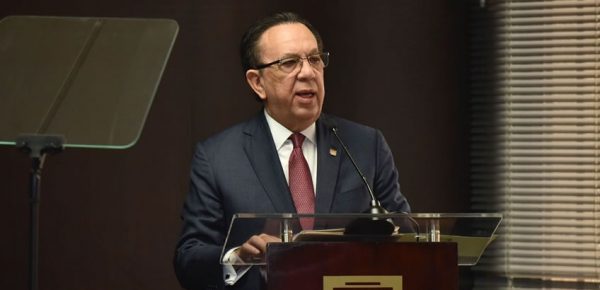
Central Bank Governor Hector Valdez Albizu and Hacienda Minister Donald Guerrero announced on Wednesday, 18 March 2020, measures that have been agreed upon with the Monetary Board to promote keeping jobs and preserving the health of the Dominican people in days of the Covid-19 virus. They announced special regulatory treatment for the financial sector in this early phase of the crisis. “The plan is to avoid a possible deterioration of the credit portfolio of banks due to the impact of Covid-19,” said Valdez.
Among the new conditions, he said that the credit rating of borrowers that cannot meet payments will be frozen to the score they had previously and the borrowers will be given 60 days to eliminate their arrears.
He said that in many cases, borrowers will be able to make use of new contingency funds that are becoming available and likewise will be able to renegotiate their loans at a lesser rate. He said interest rates of 8% will become available for exporters.
Valdez Albizu explained the Dominican economy is prepared for the situation. “We enter this situation with a strong macroeconomic standing. The country has low and stable inflation, high international reserve levels, and dynamic credit. This means the country has the capacity to act and face the effects of Covid-19,” he said. He said the measures being taken by the Central Bank, Monetary Board and the Dominican government will contribute to maintain the economic stability.
The Monetary Board decided on measures to reduce the financial impact on people and companies, and the Central Bank is making available increased resources through the banks in coming weeks. The leading economic authorities announced the government is working in collaboration with the private sector. Nevertheless, Valdez nor Guerrero had answers to how the government would assist the informal sector that makes up an estimated 58% of jobs in the country.
Central Bank Governor Hector Valdez Albizu announced US$500 million is being injected to increase money in circulation given the collapse of the tourism and farm exporter sectors. Valdez Albizu estimated that from March to June 2020, the country stands to lose around US$400 million in tourism receipts. “Tourism is the country’s main generator of hard currency, and it is practically shut down due to the coronavirus crisis,” he said speaking in the presence of members of the Monetary Board and the press. He explained that to stimulate the economy, funds are also released from legal reserve restrictions, that is 2.7% of the 20% legal reserve.
Valdez also announced half of the staff of the Central Bank will be working from home during the crisis.
Valdez forecast the measures will enable the country to keep the pace of growth of recent years, with stability of growth and development and assistance to vulnerable sectors. He said so far this year the Dominican peso has only suffered a 1.4% depreciation.
He said that the government has a US$158 million emergency contingency fund approved by Congress as part of the 2020 National Budget. He said the World Bank has also made available 50% of the quota, or an additional US$330 million, at 1.5% interest rates for balance of payment and exchange difficulties. He said these funds would only be used if they can be allocated to the Ministry of Hacienda because he said the Central Bank does not have balance of payment or exchange problems.
Valdez said what is happening in the Dominican Republic is small compared to what other large countries are going through.
Speaking during the same event, Hacienda Minister Donald Guerrero spoke of the measures to benefit formal businesses. He did not have a plan for the informal sector.
Guerrero said that export free zones, farms should apply flexible work conditions and promote work from home to avoid concentrations of their workforce and promote social distancing. He announced banks would be open from 8 to 5:30 pm.
He said that grocery stores, supermarkets, gasoline stations and pharmacies are authorized to remain open, but funeral services are being limited to only relatives of the deceased. The government-operated Santo Domingo metro and skylift will continue to operate with regular schedules, as well as OMSA government buses. Media and telecommunications services are authorized to continue operating.
Guerrero said the government has yet no plan for the informal sector. Around 58% of jobs in the Dominican Republic are in the informal sector. Guerrero said: “We are taking measures on a day-by-day basis. We are aware it is a sector that needs our attention. The formal small business sector will be the first to benefit with the low cost loans from banks. We will take steps to alleviate other sectors.”
On Wednesday, 18 March in the evening, Modern Revolutionary Party (PRM) presidential candidate, Luis Abinader was prompt to recommend the government set up a RD$5 billion contingency fund to assist those losing their jobs or work income with a minimum RD$10,000 each. Abinader estimates half a million Dominicans will be affected by the impact of Covid-19 on the Dominican economy.
Read more in Spanish:
Bancentral
Hoy
El Dia
El Caribe
Bancentral
Diario Libre
19 March 2020

